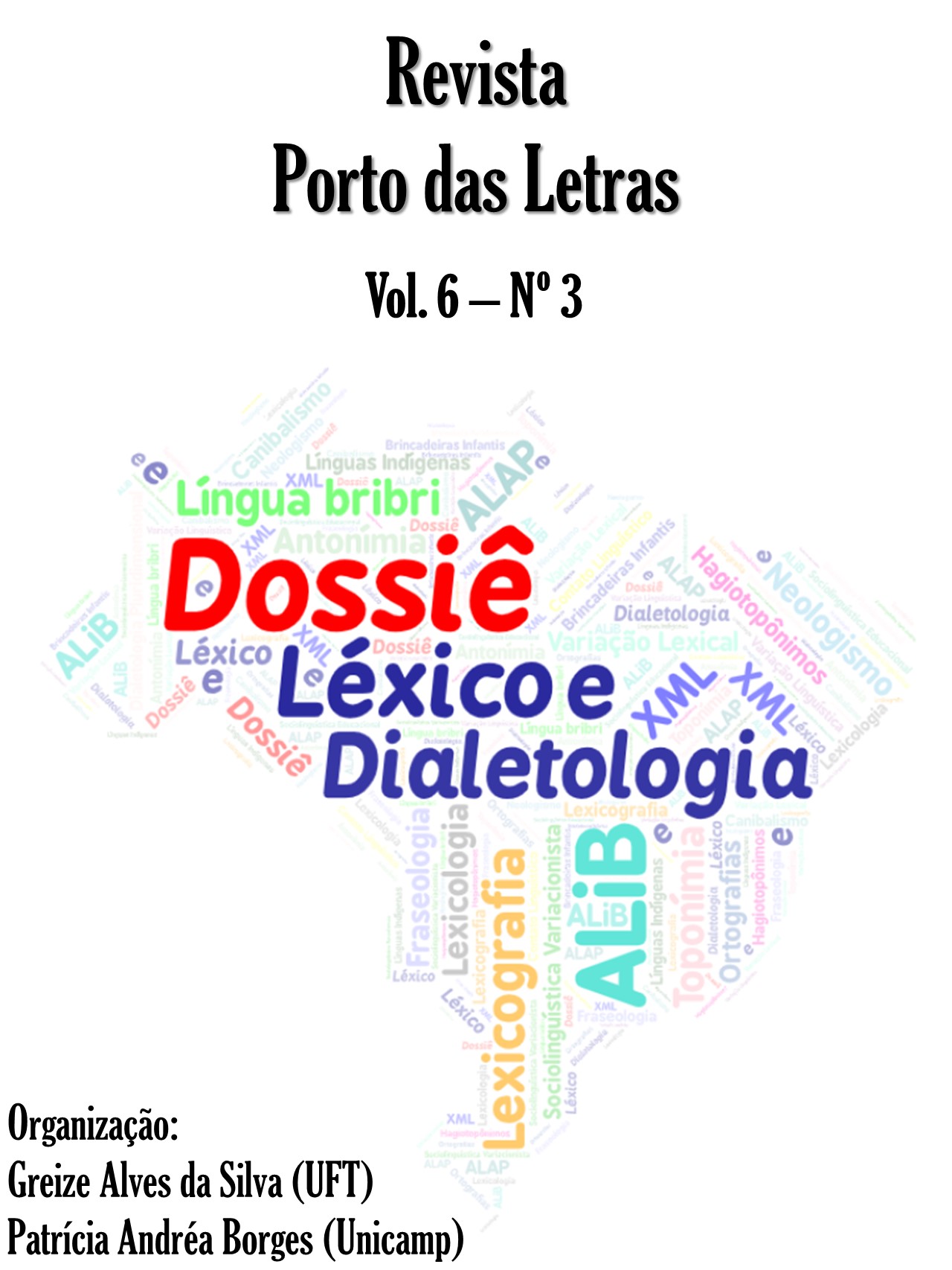A CONSTRUÇÃO DE SENTIDOS DA LEXIA “CANIBALISMO” NO ROMANCE POLICIALESCO CONTEMPORÂNEO JANTAR SECRETO, DE RAPHAEL MONTES
Palavras-chave:
Léxico, Canibalismo, Literatura Brasileira Contemporânea, Literatura Policial, MídiaResumo
Neste trabalho, estabelecemos como corpus o léxico em Jantar Secreto, de Raphael Montes, romance inserido no gênero policialesco brasileiro contemporâneo. Considerando o “canibalismo” como tema central da obra, observamos as relações que podem ser estabelecidas entre o léxico e algumas esferas do discurso. Partindo da concepção de que o léxico de uma língua, em sua dimensão individual, é entendido como um conjunto de representações sempre passível de transformação (BIDERMAN, 1998), este trabalho pretende abordar os diferentes sentidos atribuídos à essa unidade. Para tanto, tomamos como ponto de partida a percepção da unidade lexical “canibalismo” em contextos de uso de diferentes esferas do conhecimento (jurídica, antropológica, midiática etc.) e contrastamos esses sentidos aos propostos no romance, atentando-nos para os elementos que atuam em sua retextualização literária. Dessa forma, propõe-se uma reflexão sobre os sentidos cristalizados em uma língua por meio da aquisição social do léxico, presentes em alguns textos jornalísticos, em contraste com a possível desestabilização desses sentidos proposta pela elaboração estilística. Os resultados obtidos até o momento apontam para a construção de sentidos diversos acerca do canibalismo no decorrer da obra literária e das notícias selecionadas.
Referências
ANTUNES, Irandé. Território das palavras: estudo de léxico em sala de aula. São Paulo: Editora Parábola, 2012.
AULETE, Caldas. Aulete Digital — Dicionário Contemporâneo da Língua Portuguesa: Dicionário Caldas Aulete, vs online. Disponível em http://www.aulete.com.br/ Acesso em julho de 2019.
BATISTA, Ronaldo de Oliveira. A palavra e a sentença: estudo introdutório. São Paulo: Editora Parábola, 2011.
BIDERMAN, Maria Tereza Camargo. Dimensões da palavra. Filologia e Linguística Portuguesa, n. 2, 1998, p. 81-118.
BIDERMAN, Maria Tereza Camargo. Teoria Linguística. São Paulo: Martins Fontes, 2001.
BORBA, Francisco da Silva. Léxico e herança social. In: MARCHEZAN, Renata Coelho; CORTINA, Arnaldo. (Org.). Os fatos da linguagem, esse conjunto heteróclito. 1a. ed. Araraquara: Cultura Acadêmica Editora, 2006, v. 10, p. 81-96.
BRASIL. Decreto-Lei 2.848, de 07 de dezembro de 1940. Código Penal. Diário Oficial da União, Rio de Janeiro, 31 dez. 1940. Disponível em https://www2.camara.leg.br/legin/fed/declei/1940-1949/decreto-lei-2848-7-dezembro-1940-412868-publicacaooriginal-1-pe.html. Acesso em 31 de outubro de 2019.
CABRAL, Álvaro; NICK, Eva (Org.). Dicionário técnico de psicologia. São Paulo: Cultrix, 1979. (eBook).
CANIBAIS: que crime comete quem come carne humana. Folha de São Paulo. Para entender direito, 2012. Disponível em http://direito.folha.uol.com.br/blog/canibais-que-crime-comete-quem-come-carne-humana. Acesso em 31 de outubro de 2019.
CANIBALISMO: você não pode comer os restos mortais de alguém. Folha de São Paulo. Para entender direito, 2011. Disponível em http://direito.folha.uol.com.br/blog/canibalismo-voc-no-pode-comer-os-restos-mortais-de-algum. Acesso em 31 de outubro de 2019.
CATTANI, Frederico. Vilipêndio a cadáver. 2013. Disponível em: https://jus.com.br/artigos/24946/vilipendio-a-cadaver Acesso em: 31 de outubro de 2019.
CLONAZEPAM. Farm. Resp.: Dra. Miriam Onoda Fujisawa - CRF-SP nº 10.640. Campinas- SP: Medley Indústria Farmacêutica Ltda., 2011. Bula de remédio. Disponível em: https://bula.medicinanet.com.br/bula/1563/clonazepam.htm Acesso em: 31 de outubro de 2019.
DIJK, Teun. A. Van. Política, ideología y discurso. Traducción de Ana Irene Méndez. Quórum Académico.v. 2, n. 2, 2005, p. 15-47.
DIJK, Teun. A. van. Semántica del discurso e ideología. Traducción de Cristina Perales. Discurso & Sociedad. v. 2(1), 2008, p. 201-261.
DIJK, Teun. A. van. Discurso e Contexto: uma abordagem sociocognitiva. São Paulo: Contexto, 2012.
FRANÇA, Julio; SASSE, Pedro Puro. O Fascínio do Crime: João do Rio e as raízes da literatura policial no Brasil. In: VIEGAS, Ana Cristina Coutinho; PONTES JR, Geraldo; MARQUES, Jorge Luiz (Orgs.). Configurações da Narrativa Policial. Rio de Janeiro: Dialogarts Publicações, 2016, p. 70-91.
FULLER, Lon L. O caso dos Exploradores de Cavernas. Tradução de Ivo de Paula, LL. M. São Paulo: Liv e Ed Universitária de Direito, 2008.
HENRIQUES, Claudio Cezar. Léxico e Semântica: estudos produtivos sobre palavra e significação. Rio de Janeiro: AltaBooks, 2018.
HOMEM mata e come a mãe: ‘Não há cura para a minha loucura’. Notícias ao minuto Brasil. Mundo. 2019. Disponível em https://www.noticiasaominuto.com.br/mundo/893404/homem-mata-e-come-a-mae-nao-ha-cura-para-a-minha-loucura. Acesso em 02 de agosto de 2019.
HOUAISS. Dicionário eletrônico Houaiss da língua portuguesa. Rio de Janeiro: Objetiva, 2009.
JAMES, Phyllis Dorothy. Segredos do romance policial: história das histórias de detetives. Tradução de José Rubens Siqueira. São Paulo: Três Estrelas, 2012.
LESTRINGANT, Frank. O Canibal: Grandeza e decadência. Tradução de Mary Lucy Murray Del Priore. Brasília: Editora Universidade de Brasília, 1997.
MARQUES, Jorge Luiz. Um caso em investigação: o gênero policial. In: VIEGAS, Ana Cristina Coutinho; PONTES JR, Geraldo; MARQUES, Jorge Luiz (Orgs.). Configurações da Narrativa Policial. Rio de Janeiro: Dialogarts Publicações, 2016, p. 221-228.
MARTINS, Nilce Sant'anna. A estilística da palavra. In: MARTINS, Nilce Sant’anna. Introdução à estilística: a expressividade na língua portuguesa. São Paulo: EDUSP, 1989, p. 71-127.
MASSI, Fernanda. O romance policial do século XXI. São Paulo: Cultura Acadêmica, 2011.
MONTES, Raphael. Jantar Secreto. São Paulo: Companhia das Letras, 2016.
MULHER é estuprada e tem corpo devorado por canibais em festa. Meio Norte. Curiosidades. 2019. Disponível em https://www.meionorte.com/curiosidades/mulher-e-estuprada-e-tem-corpo-devorado-por-canibais-casos-chocantes-366137. Acesso em 31 de outubro de 2019.
POLGUÈRE, Alain. Lexicologia e Semântica Lexical: noções fundamentais. Tradução de Sabrina Pereira de Abreu. São Paulo: Contexto, 2018.
TODOROV, Tzvetan. As estruturas narrativas. Tradução de Leila Perrone-Moisés. São Paulo: Perspectiva, 2006.
TRASK, Robert Lawrance. Dicionário de linguagem e linguística. Tradução de Rodolfo Ilari. São Paulo: Contexto, 2011.
VIERA, Josenia Antunes; MACEDO, Denise Silva. Conceitos-chave em análise do discurso crítica. In: BATISTA JR., José Ribamar Lopes; SATO, Denise Tamaê Borges; MELO, Iran Ferreira de (Orgs.). Análise de discurso crítica para linguistas e não linguistas. São Paulo: Parábola, 2018, p. 48-77.
Downloads
Publicado
Como Citar
Edição
Seção
Licença
Os autores concordam com os termos da Declaração de Direito Autoral, que se aplicará a esta submissão caso seja publicada nesta revista (comentários ao editor podem ser incluídos a seguir).

